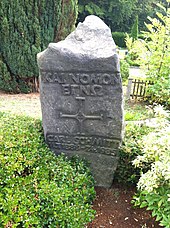Nomos (Carl Schmitt)
Nomos is a term used in Carl Schmitt's philosophy in the sense of "spatial planning". Schmitt describes the nomos as a “unity of positioning and order”. In his late work in the context of international law considerations, it is of outstanding importance (“The nomos of the earth in international law of the Jus Publicum Europaeum”, 1950).
origin
The word nomos has two basic meanings, both of which come from ancient Greek :
- Νομός, Nomós (stress on the second syllable) in the spatial sense of " district " and
- Νόμος, Nómos (stress on the first syllable) in the legal sense of " law ".
The spatial sense is the older:
- The Greek word for the first measurement, which establishes all of the following standards, for the first land acquisition as the first division and division of space, for the original division and distribution is: nomos.
The original meaning is "home", "Gau", "pasture" (see also article nomad ). The Greek word “Nemos” is derived from the same root and can have a cultic meaning as “forest”, “grove”, “forest”.
Term at Schmitt
For him, this nomos is the source and basis of every legal system.
- "So the land acquisition for us externally (towards other peoples) and internally (for the land and property order within a country) is the original type of a constitutive legal process."
This also applies to him if the land is “taken away from the previous, recognized owner and master” , which means a more difficult “legal problem” than the “acquisition of previously free, ownerless land” . This point of view becomes relevant for him in connection with the occupation of the “New World” by European peoples. In doing so, he postulates the right of a people who are at a higher cultural level to annex areas with residents who are at a lower cultural level and formulates the first question under international law:
- "[...] whether the countries of non-Christian, non-European peoples and princes are" free "and ownerless, whether the non-European peoples are at such a low level of organization that they become objects of organization by higher-level peoples."
Consistently, Schmitt therefore explains in relation to the land grabbing of colonial soil:
- “A completely different problem from the land grabbing, which took place in the form of changing the state empire over a state territory while at the same time maintaining the private property and economic system in Europe, was the land grabbing of free colonial land outside Europe. This land could be freely occupied as long as it did not yet belong to a state within the meaning of European interstate domestic law. With completely uncivilized peoples, the power of the native chiefs was not an empire, and the use of the land by the natives was not property. […] Here, the land-taking state did not need to take any consideration with regard to the rights to the land that it found within the acquired land, unless it was about the private property of citizens of civilized states who were members of the order of international law. Whether the relationship of the natives to the land, in agriculture, pasture or hunting, as found by the conquering state, was to be regarded as property or not, was a question in itself and was solely subject to the decision of the conquering state. International legal considerations in favor of the land rights of the natives, [...], do not exist on colonial soil in favor of the natives.
- The land-taking state can treat the captured colonial land as ownerless in terms of private property [...] " (emphasis added by Schmitt)
The otherwise applicable legal principle that the law of the crime scene applies at the time of the crime was not applied to colonial soil.
Since the Peace of Westphalia in 1648, according to Carl Schmitt, the European states have been viewed as “moral persons” (in the sense of “legal persons”) who coexist with equal rights under natural law. As a result, a no longer discriminatory (that is, no longer differentiating between attacker and defender) war term became possible, which considered the warring states equal under international law and enabled the separation of the terms “enemy” and “criminal”. This also made it possible to “guard against war”. After the loss of the order constituted by the Peace of Westphalia, the question of a “new nomos of the earth” arises.
literature
- Raphael Gross: Carl Schmitt and the Jews . A German legal theory. Revised and expanded edition of the 1st edition. Suhrkamp-Taschenbuch Wissenschaft 1754, Frankfurt am Main 2005, ISBN 3-518-29354-0 (also dissertation at the University of Essen , 1999).
- Carl Schmitt : The nomos of the earth in international law of the Jus Publicum Europaeum . Duncker & Humblot, Berlin 1950.
- Carl Schmitt: Take, share, graze. An attempt to put the basic questions of every social and economic order right from the nomos. (1953) In: Constitutional articles from the years 1924-1954 , Duncker & Humblot, Berlin 1958, pp. 489-504.
- Carl Schmitt: State, Greater Area, Nomos. Works from the years 1916–1969 . Ed., With a foreword and annotations by G. Maschke. Duncker & Humblot , Berlin 1995.
- Wolfgang Palaver : Carl Schmitt on Nomos and Space . In: Telos No. 106 (Winter 1996) 105-127.
- Wolfgang Palaver : Globalization and Sacrifice . Carl Schmitt's theory of the nomos. In: B. Dieckmann (Ed.): The victim - current controversies . LIT, Münster 2001, pp. 181-206.
Individual evidence
- ↑ Schmitt: Nomos der Erde , page 36
- ↑ Schmitt: Nomos der Erde , page 44.
- ↑ Schmitt: Nomos der Erde , page 17.
- ↑ Schmitt: Nomos der Erde , page 16.
- ↑ Schmitt: Nomos der Erde , page 108 f.
- ↑ Schmitt: Nomos der Erde , page 171.
- ↑ Schmitt: Nomos der Erde , page 116 ff.
- ↑ Schmitt: Nomos der Erde , page 158 f., 161.
